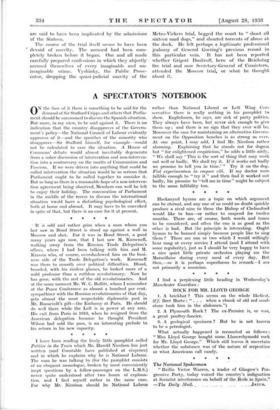A SPECTATOR'S NOTEBOOK
ON the face of it there is something to be said for the demand of Sir Stafford Cripps and others that Parlia- ment should be summoned to discuss the Spanish situation. But more, in my view, to be said against it. There is no indication that the country disapproves of the Govern- ment's policy—the National Council of Labour evidently approves of it—and the speeches of the minority who disapprove—Sir Stafford himself, for example—would not be calculated to ease the situation. A House of Commons' debate would almost inevitably degenerate from a sober discussion of intervention and non-interven- tion into a controversy on the merits of Communism and Fascism. If we were driven into anything that could be called intervention the situation would be so serious that Parliament ought to be called together to consider it. But so long as there is a reasonable hope of a non-interven- tion agreement being observed, Members can well be left to enjoy their holiday. The convocation of Parliament in the middle of the recess to discuss the international situation would have a disturbing psychological effect, both at home and abroad. It may have to be convoked in spite of that, but there is no case for it at present.
flt is odd and rather grim when a man whom you last saw in Bond Street is stood up against a wall in Moscow and shot. For it was in Bond Street, a good many years ago now, that I last saw M. Kameneff, walking away from the Russian Trade Delegation's offices, where I had been talking with him and M. Krassin who, of course, overshadowed him on the busi- ness side of the Trade Delegation's work. Kameneff was there to smooth over political difficulties. Blond, bearded, with his rimless glasses, he looked more of a mild professor than a ruthless revolutionary. Now he has gone, with the rest of the old revolutionaries. And at the same moment Mr. W. C. Bullitt, whom I remember at the Peace Conference as almost a hundred per cent. sympathiser with the Russian revolutionaries of that day, gets almost the most respectable diplomatic post in Mr. Roosevelt's gift—the Embassy at Paris. He should do well there. while the Left is in power at any rate. His exit from Paris in 1919, when he resigned from the American delegation because he thought President Wilson had sold the pass, is an interesting prelude to his return in his new capacity.
* • * 1 have been reading the lively little. pamphlet called Politics in the Train which Mr. Harold Nicolson has just written (and Constable have published at sixpence) and in which he explains why he is National Labour. The man he was talking to (for the pamphlet consists Of an eloquent monologue, broken by most conveniently inept questions by a fellow-passenger on the L.M.S.) never quite understood after two hours of explana, tion, and I find myself rather in. the same ease. For why Mr. Nicolson should be National Labour rather than National Liberal or Left Wing Con- servative there is really nothing in his pamphlet to show. Englishmen, he says, are sick of party polities. They always have been, but never sick enough to give them up ; and there is no sign that they ever will be. Moreover the ease for maintaining an alternative Govern- ment on the Opposition benches is as strong as ever. At one point, I may add, I find Mr. Nicolson rather alarming. Explaining that he stands not for dogma but " for enlightened empiricism," he adds a little airily, " We shall say ' This is the sort of thing that may work out well or badly. We shall try it. If it works out badly we promise to tell you in time.' " Try it on the dog. Fiat experimentum in corpore viii. If my doctor were fallible enough to " try it " and then find it worked out badly, his promise to "tell me in time" might be subject to the same fallibility too.
* * * * Hackneyed hymns are a topic on which argument can be eternal, and any one of us could no doubt quickly produce a rival nine to those the Bishop of Chelmsford would like to ban—or rather to suspend for twelve months. There are, .of course, both words and tunes to be considered, and often the one is as good as the other is bad. • But the principle is interesting. Ought hymns to be banned simply because people like to sing them ? There are one or two which I would, willingly hear sung at every service I attend (and I attend with some regularity), just as I should be very happy to have a nice quiet little private orchestra playing me the Marseillaise during every meal of every day. But then,—as it is perhaps superfluous to remark—I am not primarily a musician.
* I find a perplexing little heading in 'Wednesday's Manchester Guardian : ROCK FOR MR. LLOYD GEORGE 1. A brickbat ? This seems on the whole' likeliest.' (Cf. Bret Harte': " . . . when a chunk of old red sand- stone took him in the abdomen.") 2. A Plymouth Rock ? The ex-Premier is, or was, a great poultry-fancier.
3. A geological specimen ? But he is not known• to be a petrologist.
What actually happened is recounted as follows ; " Miss Lloyd George bought some. Llanerchymedd rock for Mr. Lloyd George." Which still leaves it uncertain whether the substance was of the nature of serpentine or what Americans call candy.
* * The National Spokesman " Baillie Victor Warren, a leader- of Glasgow's Pro- gressive Party,. today .voiced the country's indignation, atSocialist interference on behalf of the Reds in Spain." .






































 Previous page
Previous page